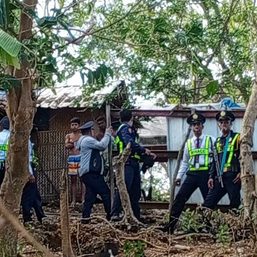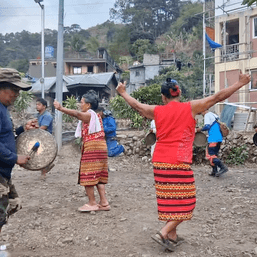SUMMARY
This is AI generated summarization, which may have errors. For context, always refer to the full article.

BAGUIO CITY, Philippines – The Office of the Ombudsman has ordered the dismissal from service of former National Commission on Indigenous Peoples-Cordillera Administrative Region head Roland Calde for grave misconduct.
Roger Sinot Sr. – who filed two complaints against former NCIP-CAR director Roland Calde over the selection of Indigenous Peoples Mandatory Representative (IPMR) in the Baguio City Council – said on Monday, June 27, that he received the decision on June 24.
Graft Investigation and Prosecution Officer Lauren Divino-Sudweste signed her decision on March 29. Maria Cecilia Cerdena, executive assistant III of the Ombudsman head office certified a true copy on June 13 showing Ombudsman Samuel R. Martires’ approval of the decision.
Calde, who heads NCIP-Central Luzon, told Rappler he has not seen the decision.
“We will file [a motion for reconsideration] after we receive it,” Calde said in a text message on June 27.
Divino-Sudweste said there was “substantial evidence” to hold Calde liable for grave misconduct in relation to the first complaint filed in June 2017.
However, the ruling found “no substantial evidence” for the other complaints against Calde – grave misconduct and conduct prejudicial to the best interest of the service – filed by Sinot in December 2017.
In the first complaint, Sinot alleged that the former NCIP-CAR chief discriminated against him and favored a candidate from another IP group.
His second complaint alleged that Calde committed grave misconduct in asking hydropower and mining companies to sponsor the 20th Indigenous People’s Rights Act anniversary celebration.
Discrimination, undue delay
Divino-Sudweste noted Calde’s repeated directive creating a review body to examine if the November 2016 process of selecting an IP representative followed the customary law ratified by the Baguio Ibaloy.
Despite affirmation of its validity in the first review, and NCIP Baguio Officer-in-Charge Harriet Abyadang confirming the regularity and validity of the process, the former director still created a second review committee. This body rejected the selection of Sinot.
Even after the NCIP Central Office greenlighted the issuance of a certificate of affirmation for Sinot, Calde unduly delayed release of the document, the ruling added, without stating the date of the central office action.
“It seems that respondent Calde kept passing the matter from one office to another until he was able to get a recommendation that was unfavorable to (the) complainant,” Divino-Sudweste noted.
The ruling said Calde only issued the document after the NCIP chairperson ordered him in December 2017, a year after Abyadang endorsed the confirmation of Sinot as Baguio IPMR.
“It was clearly established therefore, that respondent Calde neglected or failed to act within reasonable time on OIC Abyadang’s endorsement dated 27 December 2016 for the issuance of Certificate in complainant’s favor without sufficient justification, for the purpose of discriminating against complainant,” said the decision.
Aside from dismissal, the Ombudsman also ordered the cancellation of Calde’s eligibility, the forfeiture of retirement benefits, and perpetual disqualification from government service.
Still no IPMR
In a June 27 interview, Sinot welcomed the decision, calling it the “light at the end of the tunnel.”
Despite the development, Baguio will remain without an IPMR.
Just days after taking oath in January 2018, a Baguio regional trial court issued a temporary restraining order against Sinot’s assumption of his post in the city council.
The following month, RTC Branch 6 Judge Cecilia Corazon Dulay-Archog granted the writ of preliminary injunction, prohibiting the city government from recognizing Sinot as IPMR.
Sinot said the court has yet to decide on the motion for reconsideration they filed. He expressed hope that the Ombudsman’s ruling will fast track the settlement of other pending cases related to his assumption of office.
“Hopefully, they will give justice for the indigenous peoples of Baguio [who] have been deprived of representation until now,” he said. – Rappler.com
Add a comment
How does this make you feel?









There are no comments yet. Add your comment to start the conversation.